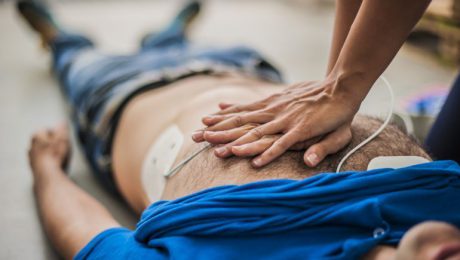©
Page 1 of 2
Helpful Information
for Caregivers of Seniors with Cancer
Caregiving for a senior with cancer comes with many challenges. Seniors with cancer often experience longer recoveries. Here’s what caregivers need to know to help.
It’s estimated that 39% of people will be diagnosed with cancer in their lifetime. Many individuals living with cancer are over the age of 65. (Cancer.gov)
Many seniors face challenges as they age, particularly health problems. For some, cancer further complicates their care. Caregivers offering support
to seniors with cancer must be aware of the unique challenges their seniors face.
Cancer Recovery Challenges for the Elderly
•
Treating cancer poses a medical dilemma. For cancer cells to be eliminated, the body is exposed to toxins in chemotherapy or damage by radiation.
•
Cancer treatment is a delicate balance between under and over treating. For frail seniors, treatment can be more harmful than cancer itself.
•
Cancer patients’ bodies have to recover not only from the effects of cancer but also from the side effects of treatment.
•
Elderly cancer patients may naturally have weakened immune systems that make recovery more difficult.
•
Recovery from cancer may be negatively impacted by other illnesses common among seniors, like diabetes or heart disease.
•
Seniors with cancer can typically expect to have a longer recovery period with more risks, side effects, monitoring, and medications than younger patients.
(Cancer Network)
TIPS FOR CANCER CAREGIVERS
CAREGIVERS
Tips for Cancer Caregivers
Maintain Your Health as You Give Care
The National Center for Biotechnical Information (NCBI) finds that 67% of family caregivers of seniors with cancer experience depression. Caregiver burnout, sleep trouble, and other unhealthy issues tend to affect those who take care of elderly cancer patients.
Take care of yourself by:
•
Sharing your struggles with loved ones
•
Receiving counseling
•
Participating in a support group
•
Sharing the burden of care with others
•
Taking time away to rest
•
Attending your own medical appointments
•
Enjoying activities that bring you joy
•
Eating healthily and exercising
© Page 2 of 2
TIPS FOR CANCER
CAREGIVERS
Home Care Tip:
Cancer treatment can involve tracking symptoms, medications, and a variety of appointments. Take the time to
organize your monitoring efforts in a planner that you, your senior, and other caregivers share.
C A R E G I V E R S
Tips for Cancer Caregivers
6 Tips for Caregiving for Seniors with Cancer
LEARN ABOUT THE TREATMENT PLAN
Whether or not you are privy to the medical information of a senior with
cancer, you can learn about their treatment plan. Find out how often
treatments are scheduled and the common side effects of treatment. This will
help you plan caregiving activities appropriately.
UNDERSTAND WHAT IS AND ISN’T COMMON
Cancer can result in symptoms such as hair loss, nausea, and memory problems.
It is important for caregivers to know about common side effects of cancer and
its treatment. When uncommon symptoms are noticed, a caregiver needs to
know who to call and at what point emergency assistance should be sought.
ANTICIPATE TREATMENT SIDE EFFECTS
Since there are so many common side effects of cancer treatment, caregivers can
often anticipate resulting needs. For example, the fatigue typical of cancer patients
will likely lower seniors’ energy level. Prepare to offer mobility assistance and limit
planned activities to accommodate for the extra rest times you can expect.
BE A SUPPORTIVE LISTENER
Individuals respond to cancer diagnoses, prognoses, and treatments differently.
While encouragement is beneficial, it’s often more valuable for caregivers to
listen supportively. Compassionate care helps seniors to enjoy a high quality of
life even with cancer’s effects.
DO NOT OVERLOOK OTHER MEDICAL CONDITIONS
Many seniors with cancer also face other medical challenges, like arthritis or
heart disease. Pay attention to the needs other medical conditions create.
Learn what you can about how other illnesses and cancer may influence each
other and impact your senior.
COLLABORATE WITH OTHER CAREGIVERS
Seniors with cancer often require 24-hour care and extensive assistance.
Work together with family members and other caregivers to keep track of side
effects, appointments, and medication administration.
(Cancer.gov, Cancer.org, Cancer Care)
1
2
3
4
5
6
©
Page 1 of 2
How to Spot Symptoms of Mental Illness in the Elderly
Normal signs of aging can mask symptoms of mental illness in the elderly. Learn about these 8 symptoms to spot mental illness among seniors.
About 58% of people over age 65 think that depression is a normal part of aging. Myths like this often prevent seniors from having mental illnesses identified and treated. (Mental Health America Survey)
According to the CDC (cdc.gov), an estimated 20% of people over the age of 55 have a mental health issue. Many mental illnesses can significantly affect physical and social well-being. Mental illnesses can, however, be hard to distinguish from regular signs of aging.
8 Common Symptoms of Mental Illness in the Aging
Signs of mental illness in the aging may be expressed verbally in discussion. Often, though, the elderly exhibit their symptoms behaviorally or physically instead. Look for these 8 symptoms in the elderly to spot mental illness during the aging process.
8 SYMPTOMS OF MENTAL ILLNESS
CAREGIVERS
Mental Illness Signs
Depression
Anxiety
Cognitive
Impairment
(cdc.gov)
Common Mental Illnesses
Among Seniors
Memory
Diseases
BiPolar
Disorder
1. UNUSUAL AVOIDANCES
For seniors, avoiding extreme heat or exhausting activities makes sense. However, avoiding eye contact, using the bathroom, touching certain objects, or participating in events is atypical. Watch for extreme or unusual avoidances.
2. DIFFICULTY MAKING BASIC DECISIONS
Decision-making is affected by memory, emotions, and judgement processes. When seniors struggle to make basic decisions or change their minds frequently the issue may be caused by mental illness.
©
Page 2 of 2
8 SYMPTOMS OF
MENTAL ILLNESS
Home Care Tip:
Due to stigmas and myths about mental illnesses, many seniors are unwilling to visit a mental health professional like a psychologist. Seniors are often more likely to be honest with primary care providers and may receive treatment from them more willingly.
CAREGIVERS
Mental Illness Signs
Risk Factors
Pre-existing conditions such as:
•
Dementia
•
Alzheimer’s
•
Parkinson’s
•
Stroke
•
Diabetes
•
Thyroid Disorders
•
Degenerative Diseases
Significant Life Changes like:
•
The loss of a loved one
•
Moving
•
Becoming disabled
•
Enduring an illness or injury
•
New medications
(Helpguide)
3. UNEXPLAINED STOMACH DISTRESS
A person’s gut reveal much about their physiological state. If a senior has unexplained digestive problems, they may be experiencing feelings or thoughts due to mental illness that are causing distress.
4. AGITATION OR MOODINESS
Irritability among seniors may occur as a result of physical conditions like chronic pain. However, agitation and moodiness that is disassociated from a reasonable cause can indicate a mental health problem.
5. CHANGE IN APPETITE OR SLEEPING PATTERNS
Often a change in eating or sleeping habits is the first sign people notice of depression. Pay attention to a senior’s routine and ask questions to understand why their habits may otherwise be changing.
6. DISINTEREST WITH FATIGUE
Feeling tired can occur as a result of aging. When tiredness becomes constant or chronic fatigue, it may be a sign of something more. Be on alert for a disinterest in hobbies or decrease in socialization due to fatigue.
7. HALLUCINATIONS OR DELUSIONS
If a senior recalls information that doesn’t make sense or that never occurred, they may be experiencing hallucinations or delusions. These symptoms may present as paranoia or as simple confusion.
8. SUDDEN CHANGES IN BEHAVIOR AND ATTITUDE
It is unusual for optimistic seniors to suddenly feel sad all of the time with no cause. Likewise, a senior who participates in a hobby regularly and without explanation stops may be struggling with a mental illness.
(Today’s Geriatric Medicine)
First Aid 101
Knowing some basic first aid tips and techniques can equip you to react in an emergency situation and help loved ones.
What is First Aid?
First Aid is helping someone who is suffering from a sudden illness or injury. It can be a complete treatment such as applying ointment and bandages to a cut, or helping the individual with a more serious injury before they can get medical attention.
First Aid Tips: Proper first aid techniques can prevent a situation from escalating until a first responder arrives
- Be prepared: Have and know where the first aid kits are in your home, car and work.
- If an injury is serious, have someone call 911 while you help care for the victim.
- Learn the signs and symptoms of various illnesses including strokes and heart attacks.
Get First Aid Certified Today
The National Safety Council offers online training (source) and a list of local classes (source).
First Aid Basics
Bleeding
- Stop the bleeding as quickly as possible by applying direct pressure to the wound with a clean cloth
- Use a tourniquet if blood loss seems to life threatening. A belt or bandana can be used to pinch off the flow of blood.
- If the wound is very large, have the person lie down and elevate the part of the body that is bleeding.
Having a Heart Attack
- Call 911
- Give the person an aspirin to help with potential heart damage.
- Perform CPR if the person stops breathing
Burned
- If the burn is mild, treat it by running it under cool water for 10 minutes.
- Then cover loosely with gauze.Never apply ice or ointment to the area.
- Call 911 if the burn is third– degree burns.
Choking
- A person who is choking cannot speak and will often clutch their hands to their throats.
- Try to make them cough by hitting your fist between their shoulder blades.
- Perform the Heimlich maneuver on them.
Signs of a Heart Attack
Signs of a heart attack include stab- bing chest pain, shortness of breath, fatigue, cold sweats, nausea, sudden dizziness, and chest discomfort.
First Aid Kit Checklist
Every home and workplace should have a First Aid Kit that is a well know location, accessible to everyone.
Anatomy of A First Aid Kit—What To Include In Yours (source)
- Absorbent compress dressings
- Various sized bandages
- Adhesive cloth tape
- Antibiotic ointment
- Antiseptic wipes
- Aspirin
- Breathing barrier (with one–way valve)
- Instant cold compress
- Non-latex gloves
- Hydrocortisone ointment
- Scissors
- Roller bandages
- Sterile gauze pads
- Oral thermometer
- Tweezers
- First aid instruction booklet
Check and Update Your Kit
- Check and replace flashlight batteries frequently
- Update emergency phone numbers
- Check the kit for refills regularly
- Check expiration dates on medications
Knowing proper first aid can help prevent bigger injuries and can help comfort an injured victim. Get certified today so you are prepared to help loved ones in a time of need.
Home Care Tip:
A “Caregiver First–Aid Kit” is an essential to home safety and care. Be sure your first–aid kit has all the critical supplies and is easily accessible to you at all times. Make a plan to check the kit regularly to discard and replace any expired or missing items.
Should You Wait for an Accident to Take the Car Keys Away from Your Senior Parent?
Most adult children don’t know how to determine if their parent should be driving or not. Read more to find out if your senior parent is safe to be on the road.
How to Tell if Your Older Adult Parent is Safe to Drive
There is a moment that comes for nearly every senior and their loved ones: the day they decide that driving is no longer an option. This can be difficult for everyone involved, but if you notice your loved one’s senses are in decline, should you wait for an accident before you take the keys from the older adult in your life? The answer is usually “no.”
Why Are Seniors More Prone to Driving Accidents?
No one wants to give up their independence, but you may actually be helping your older parent live a longer, safer life by restricting their driving privileges. The truth is, seniors over age of 65 are almost twice as likely to die in car accidents than in any other type of accident. In fact, 15 older adults die in car accidents every day and 586 are injured daily. In addition, seniors are more likely to cause an accident. This is especially true over the age of 70. Between the ages of 70 and 74, there is a spike in car accidents. Seniors over the age of 85 have even more accidents – and they tend to be more serious. The reasons for this is due to increased susceptibility to medical complications and injury. Also, seniors tend to cause more accidents due to decline in vision and cognitive function. Medications can also play a part in the increase in accidents as they can cause impairment in drivers.
How to Decrease Chances of Accidents Behind the Wheel
While the statistics may sound discouraging, there are ways to reduce the chance of a senior you love having an accident:
- If possible, avoid medications with side effects.
- Plan your route before driving.
- This will help avoid confusion later on.If you need glasses or corrective lenses, wear them.
- And consider anti-reflective coatings to help minimize glare.
Finally, one of the best ways to decrease the chance of an accident is to not drive at all. With today’s home care options, a senior can use the aid of a home caregiver to run errands and drive to appointments and other outings. If your loved one has poor vision, has arthritis or a condition that makes it difficult to turn their head, having a home care aid assist with transportation to appointments, grocery runs, and to stay active and connected in the community can be a great idea. While it’s sometimes difficult to have the conversation about driving with your loved one, don’t wait until something happens. Now is the time to do so. You’ll be glad you did.
- 1
- 2



